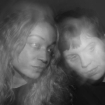Alexandra James cackles with pride as she thinks back to a recent Twin Temple concert in Nashville — not the gig itself, per se, but the gift she received at the venue: "a Tupperware container full of graveyard dirt." The offering, handed over from the "Music City Satanists," wasn't a threatening gesture. It's a tribute to "I Know How to Hex You," a groovy, Latin-flavored cut from the band's debut LP, Twin Temple (Bring You Their Signature Sound. … Satanic Doo-Wop). On the track, James belts like a Sixties soul singer over barking baritone sax and a snaking rhythm section, conjuring the Haitian voodoo spirit Baron Samedi in a horror-inspired revenge tale.
"Some of my favorite vintage horror movies are about a witch with a vendetta," she says. "I really relate to that archetype of a pissed-off witch who's been burned at the stake. That song for me was about empowering myself, and it's kind of an anthem to make you feel strong and sexy and powerful and to remind people not to fuck with you."
The singer's singularly gothic strand of doo-wop and vintage rock — summoned and executed with her husband, guitarist Zachary James — is more nuanced than the "pissed-off witch" persona may suggest. Throughout their first album, the duo explore issues like social injustice, feminism and the beauty of independent thought within candlelit tales of Satanic romance, witchcraft and wedding-day hangings. It's a compelling package that has won Twin Temple plenty of press attention and even a few high-profile gigs, including an opening spot for like-minded occult rockers Ghost.
It's also all a bit perplexing — at least on the surface. The lyrics, stage theatrics (including now-standard blood-soaked rituals) and creepy videos (the slithering snakes, knives and bloody kisses of "Sex Magick") suggest black metal more than revisionist doo-wop. "I think we enjoy the sense of cognitive dissonance that occurs when they walk into a show and think they're gonna get a Gorgoroth concert and then we're just sort of playing the oldies," Alexandra says. "I think it's also part of who we were as individuals."
Given their embrace of Beelzebub, Twin Temple could have easily redirected their energies into metal. It wouldn't have been a stretch: Both musicians grew up worshipping at the altar of punk (including icons like the Misfits) before discovering their passion for older, less overtly heavy, forms of rock. One thread runs throughout their respective journeys: Both felt like outsiders from day one.
"We both feel like we were born Satanists, so it's always been there," Zachary says. "It manifested itself in punk rock, and I've always been drawn to the macabre and the weird and not thinking twice about it. I focused all my time on that, but I was also interested in the occult and magick — figuring out there's a whole vocabulary about these things I felt."
Alexandra's earliest memories are rooted in the strange feeling that she was somehow outside the norm. "My parents immigrated here slightly before I was born, and I come from a mixed-race background," says the singer, whose father is Korean and mother is British. "I got my first death threat when I was five or six, and we ended up having to relocate from that neighbor. It was at that moment I had to ask my dad what these racist epithets meant and why he wanted to hurt me and my family. I had no clue we were different from anyone else, and it snapped into focus, like, 'Oh, we're different, and people hate me for it.' That formative experiences kind of shaped my perception of myself as an outsider. I didn't feel I belonged in mainstream culture. I didn't see myself on movies or TV — there wasn't a Barbie doll I could buy that looked like me or my family. I got into rock & roll and art and poetry really early on as an outlet, another space I could go to and feel I could express myself."

She found a "haven" in the local library, fascinated by the small sections on witchcraft and the occult. "It's all about self-empowerment," she says. "You don't necessarily even need a community to practice witchcraft. You can be a solitary witch, which I pretty much have always been and still am. Those things pretty much helped me survive." At age 13, she bought her first guitar, quickly learning the Ramones' "I Wanna Be Your Boyfriend" and suddenly her vision crystalized.
She and Zachary met, and later married, after years of bouncing around the L.A. punk scene. Together, vibing on their mutual love of doo-wop and Satanism, they formed a new, unholy union: On Halloween 2016, they engaged in a destruction ritual and shed their old skin, embracing new incarnations of themselves. The result is Twin Temple, which Alexandra calls their "magickal child."
But not everyone felt so magical about it. They faced roadblocks at virtually every turn — from publicists to managers to producers. "'You're not a rock band, you're not a metal band, you're not an indie band. What are you?'" Zachary recalls being told.
"Ironically, we were told this would have zero legs and would go nowhere," Alexandra adds. "We had people in the industry slam every single door in our face. It was like, 'How is that going to make any sense?' The doo-wop scene is like gospel, very Christian. It's very dominated by that religious philosophy, whereas Satan is metal. It's like, 'You're not going to have any fans because you're going to alienate both groups.'" She laughs. "We were like, 'All right, this is going to be the band we do to make ourselves happy,'" she continues. "'We're not quitting our day jobs. It literally doesn't matter if it makes money or not.' We were like, 'If all bets are off, we can do whatever the fuck what we want.' We [formed the band] because we wanted to see it exist in the world."

Twin Temple also faced wide criticism from Christian organizations and the right-wing alt-right press, including notorious conspiracy theorist Alex Jones. More frightening, the couple got doxxed on social media and even faced death threats. "[They'd tell] me that I'm a witch and we should start burning witches at the stake again," Alexandra says. But none of those frightening experiences slowed their progress: The duo signed to Rise Above, a traditionally metal-oriented label, for Twin Temple, which they recorded live to tape, in mono, for a suitably old-school atmosphere.
The record is, of course, rooted in doo-wop sounds — like the swooning 6/8 balladry of "Lucifer, My Love," a romantic ode to the Dark One himself. But the pair are quick to note that the genre isn't as far removed from their punk roots as novices might assume.
"The Ramones and Misfits are both straight-up playing Fifties doo-wop progressions, but [the difference] is just production and arrangement," Zachary says. "It's played twice as fast and recorded five times as shitty. It's the same exact thing. Misfits did a 'This Magic Moment' cover. The Ramones did 'Baby, I Love You' and got [early-Sixties rock & roll pioneer] Phil Spector to produce a record of theirs."
"Doo-wop seems really saccharine in this day and age, or people perceive it to be that way, because it was a black art form that was crossing over into white mainstream teenage America," Alexandra says. "This music has always been about rebellion, about individualism, about breaking down the old guard and racism and sexism and repressive attitudes toward both those things. Punk to me is just another homage to those original rock & roll mentalities and ideologies: 'Let's burn this shit down! Let's make way for a new age!'"












